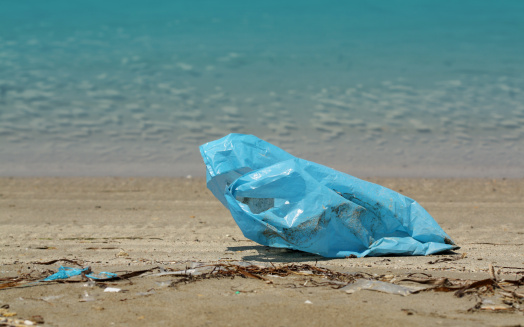
Recently passed bill awaits signing in the face of environmentalist cheers and industry fears.
Californians use approximately thirteen billion plastic bags every year. Many of those bags are thrown away, eventually winding up in the ocean and threatening marine life. The California legislature recently passed a bill that would drastically decrease plastic bag consumption throughout the state by banning many retailers from using single-use plastic bags.
’s signature of the bill is due by the end of September, although he has already stated that he “probably will sign it.” The bill would prohibit many retailers from providing single-use plastic bags. Furthermore, the ban would require stores to charge at least ten cents for any paper bags or reusable bags that it distributes – meaning that customers would save money by bringing their own reusable bags from home.
A number of cities and counties within California and throughout the country have already implemented measures ranging from bans, taxes, and labeling or recycling programs, all in an effort to reduce plastic bag use. If the recent statewide bill becomes law, California will become the first state to have adopted a comprehensive plastic bag ban – even though such bags are already effectively banned throughout Hawaii because every county there has its own plastic bag ban.
Plastic bag reduction efforts are largely aimed at combatting environmental concerns. Among these concerns are the harm to marine life from marine debris, the trash accumulation in oceans added by the roughly 32 million tons of plastic waste that is generated annually, and the large amount of petroleum products required for the manufacture of plastic bags.
However, not everyone is convinced that a ban is a good idea. California has pursued a statewide ban for several years, but until now the legislature was unable to pass such a bill given strong industry opposition. The plastic bag manufacturing industry opposes the current bill, with the American Progressive Bag Alliance arguing that the ban could cost California up to 2,000 jobs. On the other hand, the California Grocers Association has welcomed the bill, claiming that the statewide standard will ease the burden on retailers facing numerous disparate local regulations.
Jonathan Klick, an economist on the faculty of the University of Pennsylvania Law School, and Joshua D. Wright, an economist on the faculty of the George Mason University Law School and a current Commissioner of the Federal Trade Commission, raise another major concern about banning plastic bags: the impact of such bans on public health. While the current California debate has not focused much on public health risks, a ban on plastic bags would likely mean that consumers would rely more heavily on reusable bags, which can grow dangerous bacteria like E. coli, particularly given how infrequently they are washed.
After San Francisco County implemented a plastic bag ban in 2007, Klick and Wright studied its economic and public health impacts. They discovered that, following the ban, bacterial infection-related emergency room admissions increased roughly twenty-five percent. They also attributed 5.4 annual deaths to the ban. Klick and Wright further estimated the costs associated with deaths caused by the ban at approximately $45 million per year, whereas their estimates for environmental savings from reduced plastic bag waste and environmental benefits did not come close to the ban’s costs.
Based on their analysis, Klick and Wright concluded that public health costs incurred as a result of the ban are much higher than potential environmental savings. Although public health officials from San Francisco have challenged the idea that the ban was responsible for the uptick in bacterial infection-related hospital visits, they acknowledge the potential dangers of unwashed reusable bags.
Manufacturing and washing reusable bags impose environmental costs, as well. Klick and Wright cite a statistic suggesting that cotton bags must be reused at least 131 times to be as economically efficient as single-use plastic bags. They further argue that, in order to remain safe, the reusable bags would ideally need to be washed after each use. Most reusable bags cannot withstand this number of washes; thus, they argue, reusable bags are not as cost-effective as plastic bags.
While Klick and Wright’s paper provides a helpful cost-benefit analysis of San Francisco’s plastic bag ban, it only evaluated a relatively small population in just one county in California. With more than 38 million people, California’s population – and its consumption of plastic bags – is vastly larger than San Francisco’s. Such a large scale may mean either greater lives lost due to the use of contaminated reusable bags or perhaps that California’s ban will benefit from economies of scale, providing a large enough test market to foster innovation of single-use plastic bag alternatives that are environmentally friendly, economically efficient, and safe from a health perspective.
California’s pending bill even allocates $2 million for loans to assist bag manufacturers in re-purposing their facilities to make reusable bags. Those funds could perhaps encourage the development of cheaper, biodegradable, disposable bags or reusable bags that are less susceptible to bacteria and are able to withstand washing better than many available today.
If signed into law by Governor Brown, California’s ban would take effect on July 1, 2015 for most grocery stores and pharmacies, while liquor and convenience stores would need to adhere to the ban beginning the following year. Although the ban’s potential impact is still uncertain, California may not be the only state with a plastic bag ban for long, as a number of other states are considering legislation to curb their own plastic bag consumption.



